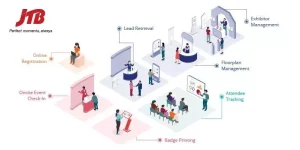Do you know how to make your corporate events WOW?
If not, then you’re at the right place.
No matter whether you’re organizing a conference, seminar, gala, or trade show, with this guide you can manage your event effectively.
To manage events effectively you need to have
- Creativity Strategic thinking
- Meticulous attention to detail.
Not just that. You also have to select the perfect venue to coordinate schedules, manage vendors, and create memorable experiences.
All these aspects play a crucial role in the success of your event.
So, how can you do it?
Learn it right here as we will take you through every step of the corporate event management process including crafting compelling event objectives, creating a targeted marketing plan, maximizing attendee engagement, and exceeding expectations along with expert tips. , and
Let’s begin with what is a corporate event.
What is a Corporate Event?
A corporate event is a gathering organized by a company for various purposes, like promoting products, building teamwork, or celebrating achievements.
These events can take different forms, such as conferences, parties, or training sessions, and are designed to achieve specific goals for the company. Planning such events involves coordinating logistics, managing budgets, and ensuring the event aligns with the company’s objectives.
This makes successful corporate events that contribute to a positive corporate culture and strengthen relationships with clients and partners. But why is it important?
Why Corporate Event Management is Important?
According to Statista research, in 2020, the annual revenue of the events and exhibition market in India was about 3.3 billion U.S. dollars. It is expected to reach over 6.7 billion dollars in 2026. The industry is forecasted to grow at a CAGR of 12.91% during the period between 2021 and 2026.
This statistic highlights that corporate event management is crucial for businesses because it helps in:
- Building Brand Image: Well-organized events showcase the brand positively.
- Networking: Events bring together industry professionals, clients, and partners for valuable connections.
- Employee Engagement: Internal events boost employee morale and commitment.
- Product Promotion: Events provide a platform for launching and promoting products.
- Knowledge Sharing: Conferences and workshops facilitate the exchange of industry insights and best practices.
- Client Relationships: Face-to-face interactions at events strengthen relationships with clients.
- Market Research: Events offer opportunities to gather feedback and insights from customers.
- Employee Recognition: Events provide a chance to recognize and reward employee achievements.
- Competitive Edge: Successful events can set a business apart from competitors.
- Public Relations: Well-executed events attract media attention, contributing to positive public relations.
Also, events allow you to gather valuable feedback and insights from attendees. This helps you to understand what your target audience needs and accordingly, you can improve your products, services, and overall customer experience.
Now that you know the importance of managing your events effectively, let’s glance at key factors here.
10 Key Elements of Corporate Event Management
Before diving into the nitty-gritty of event planning, it’s important to understand the key elements that contribute to successful event management.
1. Objective
Why are you conducting the corporate event?
Do you want to generate leads, increase brand awareness, or educate your audience?
By having the answer to these questions you get a clear understanding of your objective. This will guide your decision-making process throughout the planning and execution stages.
2. Budget
Another key factor is establishing a realistic budget. Yes, when it comes to budget you should also take into account all the expenses associated with your event, including venue rental, catering, marketing, and staff. Allocating your budget wisely will help you prioritize your spending and ensure that you stay within your financial limits.
3. Timeline
Create a detailed timeline that outlines all the tasks and deadlines leading up to the event. This will help you stay organized and ensure that you complete each task on time.
4. Team
Assemble a team of dedicated professionals who can help you bring your event to life. Delegate responsibilities and ensure that each team member understands their role and responsibilities.
5. Venue
Selecting the RIGHT venue is crucial to the success of your event. Consider factors such as location, capacity, amenities, and accessibility when making your decision.
6. Vendors
From catering services to audiovisual equipment, finding reliable and trustworthy vendors is essential. Research and compare multiple options before making your final selections.
7. Marketing
Develop a comprehensive marketing plan to promote your event and attract attendees. Use various channels such as social media, email marketing, and online advertising to reach your target audience.
8. Logistics
Pay close attention to logistics such as event registration, transportation, and accommodation. Ensure that your attendees have a seamless experience from start to finish.
9. Engagement
Create opportunities for attendee engagement throughout your event. This can include interactive sessions, networking activities, or gamification elements that encourage participation.
10. Evaluation
After the event, evaluate its success by gathering feedback from attendees and analyzing key performance metrics. This will help you identify areas of improvement for future events.
By considering these key elements and implementing them into your event planning process, you can execute a successful event.
But that’s not all.
To successfully manage your corporate event you should
- Choose the right venue and vendors
- Develop strategies for promotions and marketing
- Manage logistics and registrations
Now you must be wondering how to do it, right?
How To Effectively Manage Your Corporate Event?
Here’s how you can execute each above-mentioned factors efficiently.
1. Choosing the Right Venue and Vendors
One of the most critical decisions you have to make while planning an event is choosing the right venue and vendors.
To select the right venue you should
- Think about what your event needs – a big or cozy space. Consider how many people it can hold, how it’s set up, and if it’s easy to get to.
- Pick a place that’s easy for your guests to reach, with simple transportation and parking. Check if it’s close to hotels and restaurants.
- Keep an eye on your budget. Know all the costs, including extra fees. Talk to the place and see if you can get a good deal.
- Read what others say about the place. Look for good reviews about the space, the staff, and past events. It helps you decide if it’s the right choice.
To choose the right vendors you should:
- Research and compare different options for services like food, audiovisual stuff, decorations, and fun things. Ask them for plans or prices so you can compare.
- Check references and reviews by talking to people who used these helpers before and reading what others say online. Make sure the helpers are trustworthy and do a good job for events like yours.
- Pick helpers who ensure quality work without going over your budget. They should also be flexible for any last-minute changes that might come up.
- The helpers should communicate with you well and be quick to respond. Make sure they understand what you need for your event.
Always get a contract with your helpers. It should say what they’ll do, how much it costs, and what happens if you need to cancel. Check they have insurance in case something unexpected happens.
2. Corporate Event Promotion and Marketing Strategies
No matter how well-planned your event is, it won’t be a success if nobody knows about it. Effective event promotion and marketing strategies are essential to attract attendees and create buzz around your event. Here are some strategies to consider:
- Set Clear Goals: Clearly define what you want to achieve with your event, like networking or launching a product. This will guide your promotion.
- Know Your Audience: Identify the people you want to attend and tailor your messages to their interests. Consider their demographics and professional characteristics.
- Build a Strong Brand: Create a memorable brand for your event with a catchy logo, tagline, and key messages that show why it’s worth attending.
- Use Online Platforms: Spread the word through social media, email, and your website. Share engaging content about speakers, agenda, and event features.
- Create a Website: Make a user-friendly event website with essential details. Optimize it for search engines to increase visibility.
- Email Campaign: Reach out to potential attendees, sponsors, and stakeholders with personalized emails. Share updates, exclusive offers, and deadlines.
- Partner with Influencers: Collaborate with industry influencers or partners to expand your reach and add credibility to your event.
- Early-Bird Offers: Encourage early registrations with special discounts and limited-time promotions.
- Paid Advertising: Invest in online ads on platforms like Google Ads and social media. Target professionals in your industry and location.
- Content Marketing: Create valuable content related to your event, like blog posts or webinars, to engage attendees and promote your event.
- Spread Good Word-of-Mouth: Encourage attendees to share their excitement on social media using a unique event hashtag to facilitate conversations.
- Measure Results: Use tracking tools to measure success. Analyze registration numbers, website traffic, and social media engagement to refine your strategy for future events.
→ Note: Effective event promotion requires a multi-channel approach. By utilizing a combination of online and offline marketing strategies, you can increase your event’s reach and attract a diverse and engaged audience.
3. Manage Logistics and Registrations
Another critical aspect of successful corporate event management is – Managing logistics and registrations.
All you just have to do is:
- Save an average of 223 hours per year by opting for corporate event management software or online registration platforms with customizable forms, ticketing options, and attendee data management.
- Streamline the registration process to be simple and intuitive, minimizing steps and required information. Provide multiple registration options like online, phone, or in-person.
- Identify essential attendee information needed during registration, such as contact details and dietary preferences.
After knowing how to effectively manage your business events. It’s time to unravel secret tips to leverage your events.
11 Tips for Executing a Successful Corporate Event
Several tips for you to leverage corporate events:
- Form a dedicated team that shares your vision and delegates tasks for efficient execution.
- Maintain consistent branding with logos, colors, and fonts across signage, materials, and decor for a professional look.
- Engage your attendees with interactive elements like live polls, Q&A sessions, and networking activities.
- Ensure smooth logistics by testing technical aspects like AV equipment and internet connectivity, addressing any issues in advance.
- Offer great customer service by prioritizing attendee experience with friendly and responsive staff from arrival to the event’s end.
- Hire a photographer and videographer to capture key moments for marketing and attendee memories.
- Select unique venues like art galleries or historical landmarks for an exclusive touch.
- Use cutting-edge tech like virtual reality or interactive displays to engage and amaze attendees.
- Add some surprise performances or exceptional speakers aligned with your event’s theme.
- Create immersive experiences with themed decorations, lighting, and props for lasting memories.
- Impress attendees with personalized bags and giveaways that align with the event theme.
That’s how you create memorable and unique events. So, think outside the box, and let your creativity shine.
But wait, do you know what you are going to do after your event is over?
Measure the Success & Impact of Your Event
Once your event is over, you should evaluate its success and measure the impact it has on your attendees and your organization. Here are some key metrics and methods to consider when evaluating your event:
- Collect Attendee Feedback: Seek input from your attendees using surveys or evaluations to understand what aspects went well and identify areas for improvement. After the event, 66% of event managers engage in post-event communication through thank-you emails.
- Track Social Media: Keep an eye on social media for posts, comments, and shares related to your event. Look at likes, comments, and impressions to see how far your event reached.
- Evaluate Financial Success: Check if your event was financially successful by comparing costs with benefits. Calculate the ROI using factors like ticket sales, sponsorships, and additional revenue.
- Check Media Coverage: See how much media attention your event got by tracking mentions in newspapers, magazines, online articles, and blogs. Evaluate the reach and sentiment to understand the impact on your brand.
- Review After the Event: Analyze your event after it’s over to find strengths, weaknesses, opportunities, and threats. This will help you improve your event strategy for future events.
By evaluating and measuring the success of your event, you gain valuable insights that inform your future event-planning efforts. So, analyze the data and feedback to continuously improve and deliver exceptional experiences.
And there comes the conclusion of the entire blog.
To Wrap Up,
There is no doubt that successful corporate event management demands careful planning and flawless execution. From initial ideas to the event’s conclusion, every detail matters for a memorable experience. That’s why if you want a seamless and impactful corporate event in India, consider partnering with JTB India.
With a reputation for delivering exceptional corporate experiences, JTB India brings together creativity, precision, and professionalism. Whether you’re organizing a conference, product launch, or team-building event, JTB India becomes your reliable ally in transforming ordinary events into extraordinary moments.























